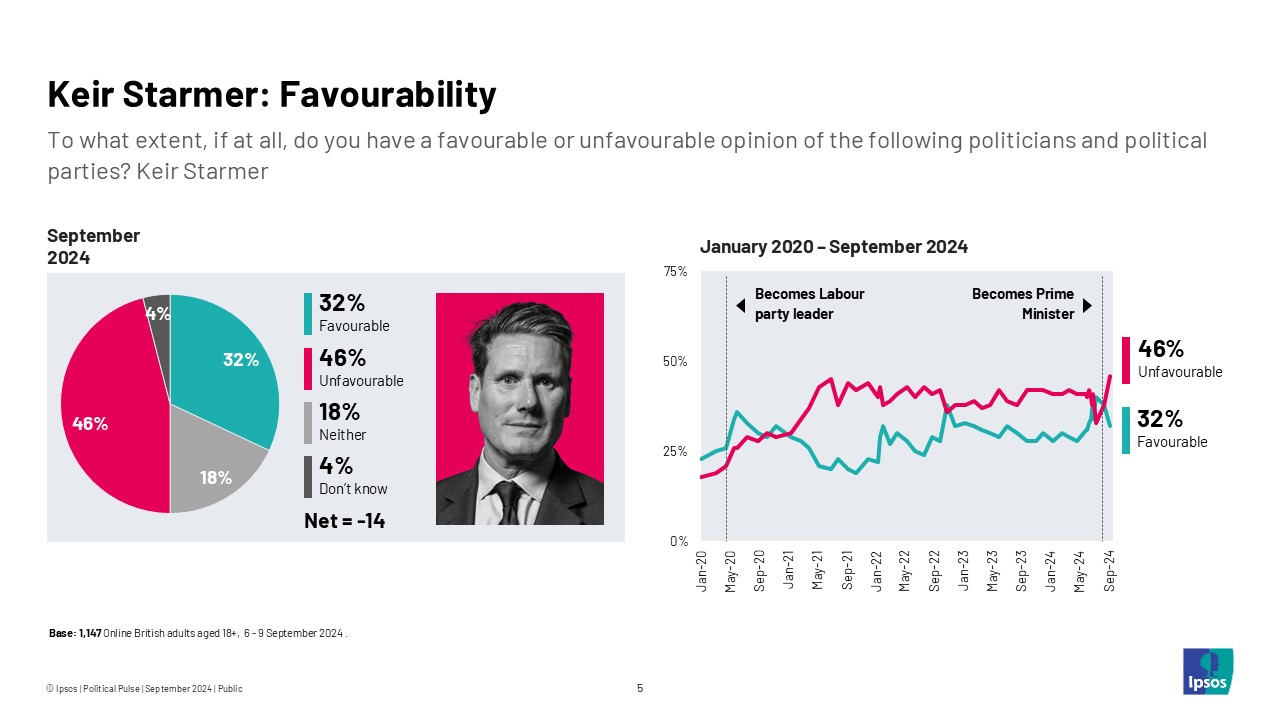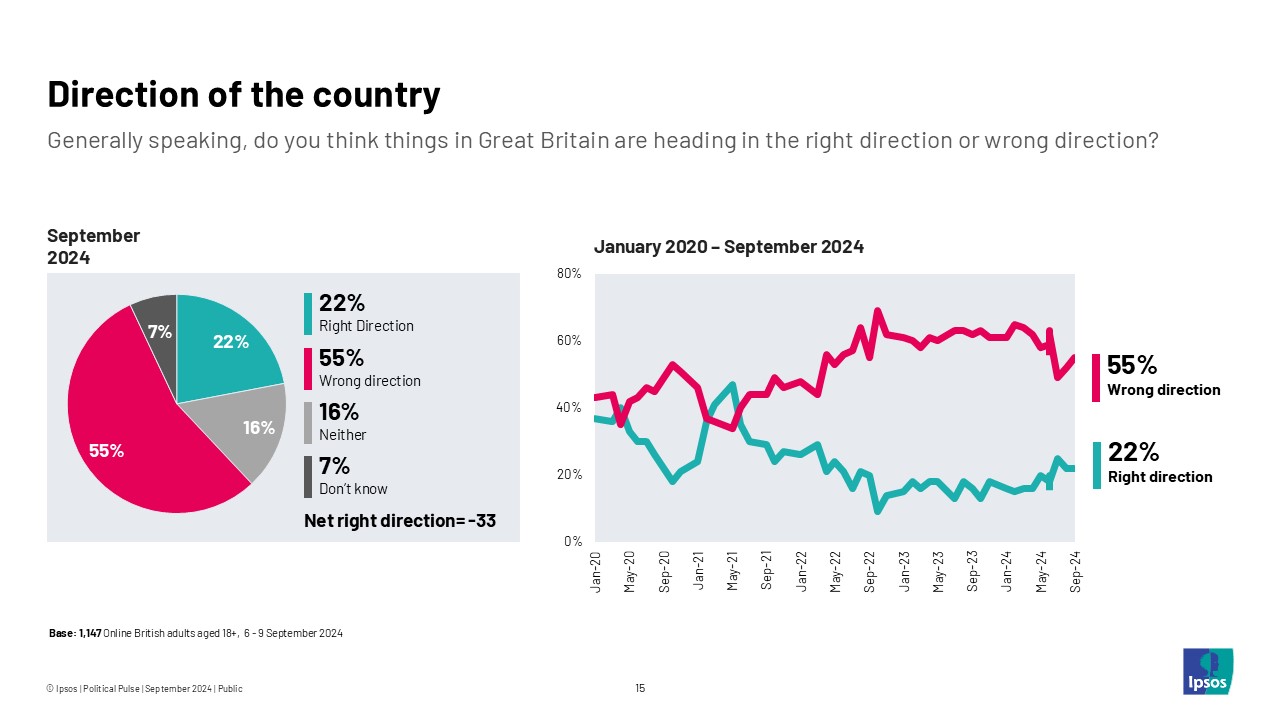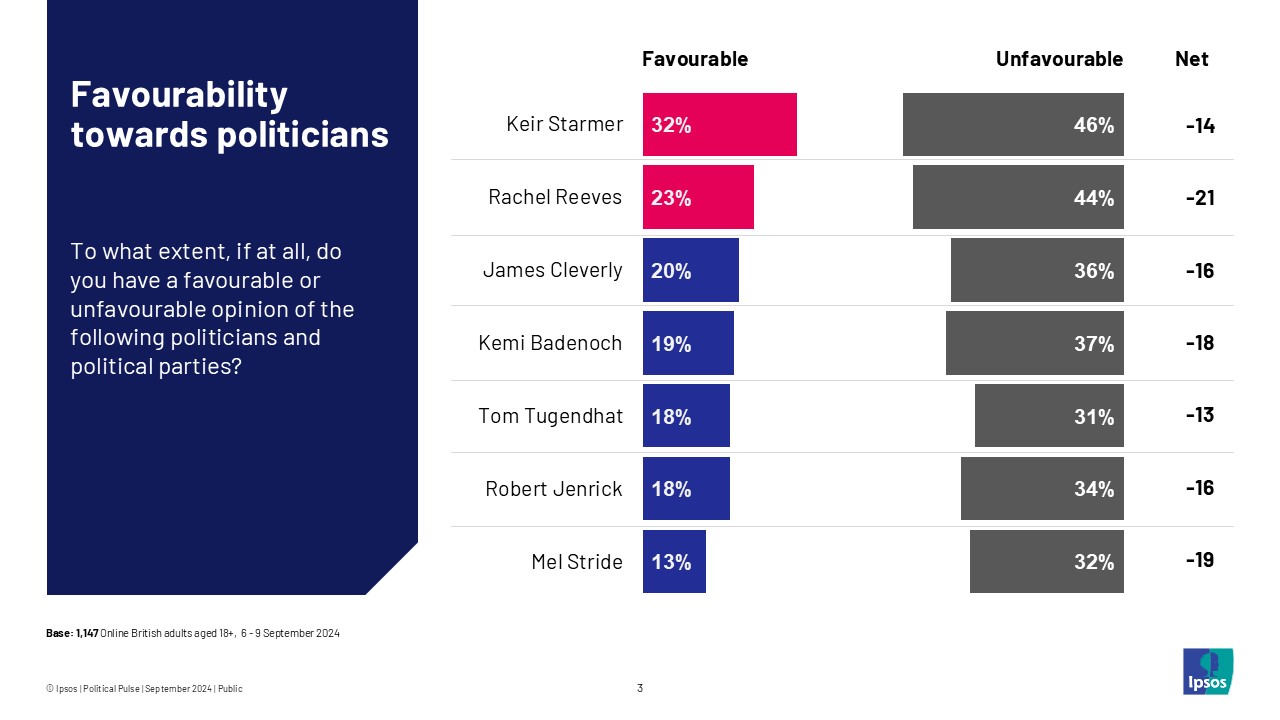Fall in public favourability towards Keir Starmer and Labour
- 46% unfavourable towards Starmer (joint highest as Labour leader)
- Labour scores worsen too – but Labour still viewed more positively (36%) than Conservatives (24%). Public less negative about Labour (45%) than Conservatives too (57%).
The latest Ipsos Political Pulse, taken 6th -9th of September, explores attitudes towards various political parties and their leaders and what direction the country is going in.
Favourability ratings
- 32% are favourable towards Keir Starmer this month (-6 from August) and 46% are unfavourable (+8pts). The 46% unfavourable matches the joint highest Starmer has recorded with Ipsos (previous high was 45% in June 2021). This was just after the Hartlepool by election.

- Meanwhile 23% are favourable towards Rachel Reeves (-4) and 44% unfavourable (+9).
- In terms of the Labour Party itself, 36% are favourable (-4) and 45% are unfavourable (+8).
- However, favourability towards Starmer and Labour is unchanged from August amongst Labour supporters. For example, 69% of 2024 Labour voters are favourable towards Starmer this month and 68% were last month. But non-Labour voters are less positive.
Direction of the country and government performance
- 55% think things in Britain are heading in the wrong direction (+3 pts from August). This is lower than the final rating recorded under the Conservatives before the General Election (62% in late June) but is higher than the first rating recorded after Labour’s victory of 49% in early July.

- This month Ipsos has introduced a new question that will be tracked across the lifetime of this parliament where we ask the public to give the government a score between 0 and 10 in terms of how they are running the country – 10 means they are doing a very good job and 0 a very bad job. Their first score is 4.4 out of 10.
Conservative leadership
- There are no notable differences in favourability scores with the public as a whole for the five remaining Conservative leadership contenders. All four are in net negative territory – with around one in five favourable and one in three unfavourable. However, large numbers do not offer an opinion either way for each candidate. Anywhere between 40-50%.

- Meanwhile, 24% have a favourable opinion of the Conservative Party overall (+3) and 52% unfavourable (-5).
Elsewhere in the poll
- 37% think Keir Starmer is likely to win the next General Election and 43% say he is unlikely to do so. In June just 14% thought Sunak was likely to win and 79% said he was unlikely. Back in June 2022, 30% thought Boris Johnson was likely to win and 59% said unlikely. 31% think the next leader of the Conservative Party is likely to win the next election and 45% say unlikely.
- 28% hold a favourable opinion towards the Lib Dems (+4), 34% unfavourable (no change).
- 30% are favourable towards the Greens (-1), 29% are unfavourable (-1)
- 28% are favourable towards Reform UK (+5) and 47% are unfavourable (-7).
- 26% think Brexit has had a positive impact on the country and 51% say it has had a negative impact. 19% say it has made no difference.
- 39% support the means testing of the winter fuel allowance and 42% oppose. Those under the age of 55 support the measure, rather than oppose, by 46% to 32% but 58% of those aged 55+ oppose.
Keiran Pedley, Director of Politics at Ipsos, said:
There are some early warning signs in these numbers for Keir Starmer and Labour. Whilst the next General Election is several years away – and perceptions of Labour remain stronger than perceptions of the Conservative Party – these figures do represent a sharp drop from those recorded in August. Moving forward, Labour will want to strike the right balance between setting public expectations about the pace of change whilst maintaining confidence that the change Labour supporters voted for in July is coming.
Technical note
Ipsos interviewed a representative sample of 1,147 adults aged 18+ across Great Britain. Interviews were conducted by telephone between the 6th – 9th September 2024. Data are weighted to match the profile of the population. All polls are subject to a wide range of potential sources of error.






